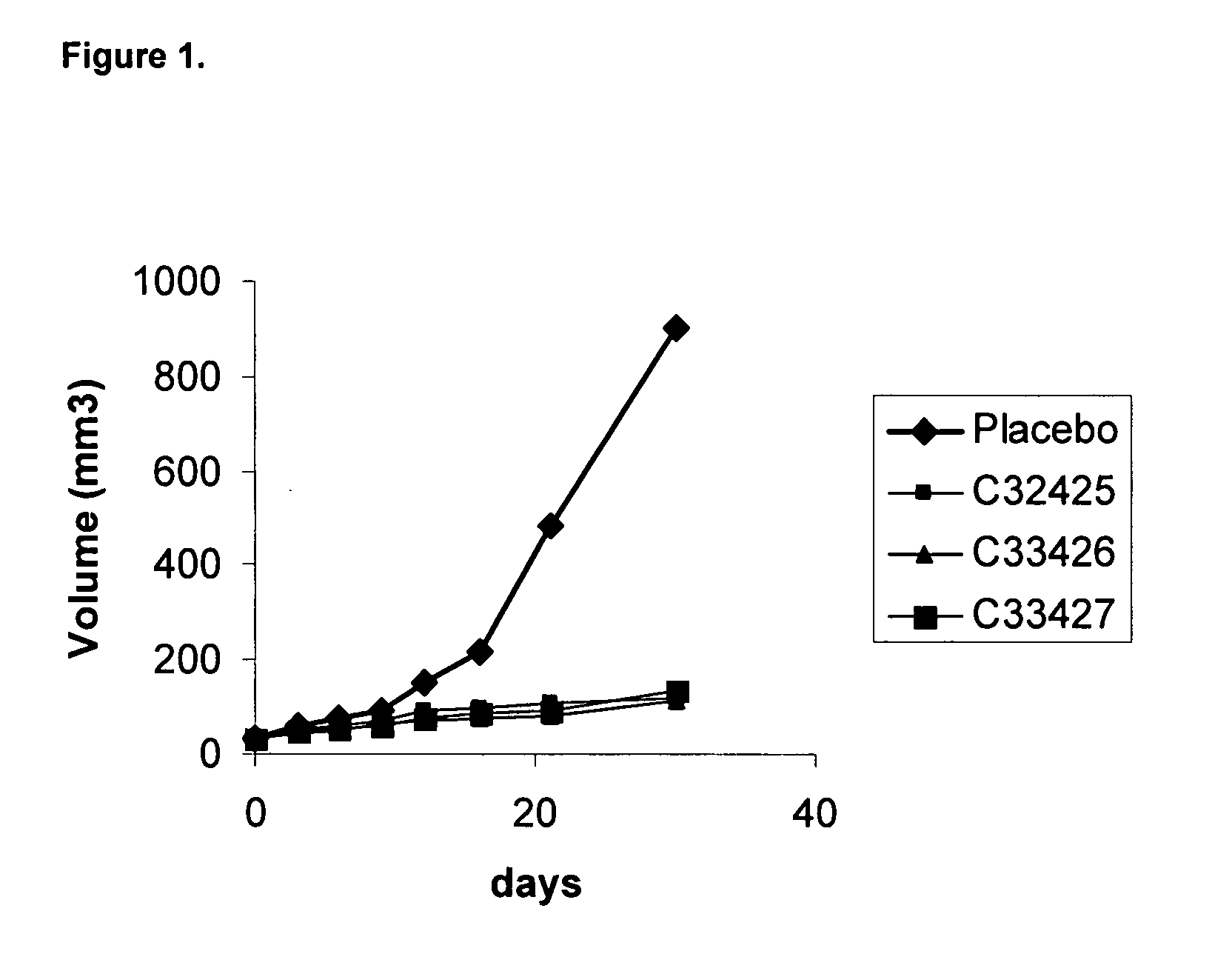Antineoplastic compounds and pharmaceutical compositions thereof
a technology of antineoplastic compounds and pharmaceutical compositions, applied in the field of molecular pharmacology, can solve the problems of inability per se to penetrate into cells, use of peptides, and decreased in vivo stability in circulation, and achieve the effect of eliciting cytotoxicity and antitumoral
- Summary
- Abstract
- Description
- Claims
- Application Information
AI Technical Summary
Benefits of technology
Problems solved by technology
Method used
Image
Examples
example 1
Selection of the Compounds by In Silico Molecular Modelling
[0031]By using a computational model, developed by massive virtual screening, several compounds were selected based in a high values for the calculated binding energy of the receptor-ligand complex, as shown in the following table. This approximated energy value is estimated taking into account an exhaustive analysis of the conformation and several energetic components, using a computational program developed in our laboratory.
TABLE 1Calculated Interaction Energies for the receptor-ligand complex.CalculatedChemicalenergy -compoundkJ mol−1Peptide P15NAC3040137.5C3040238.2C3040340.1C3040440.6C3040539.8C3040636.3C3040732.4C3040837.6C3040941.2C3041040.7C3041138.2C3041235.5C3041332.6C3041430.1C3041534.7C3141638C3141732.1C3141832.6C3141931.4C3142030C3142134.6C3142234.6C3142332.8C3142432.8C3242541.6C3342630C3342739.5C3442832.8C3442931.4C3443032.6C3443131.4C3443231.6C3443334.4C3443435.1C3443534.8C3443634.1C3443733.8C3443830.9C344394...
example 2
Effect of the Described Chemical Compounds on the Phosphorylation of a Typical CK2 Substrate
[0032]The assay consists in performing an in vitro phosphorylation reaction, using as the substrate the oncoprotein E7 from Human Papilloma Virus type 16 (VHP-16) expressed in E. coli as a Glutathione S-Transferase (GST) fusion protein. The resulting E7-GST is then purified by Glutathione-Sepharose (Pharmacia) affinity chromatography. Before the enzymatic reaction E7-GST was preincubated one hour at 37° C., with different concentrations of the chemical compounds. The reaction is carried out in a mixture consisting of 50 μl Tris:HCL 25 mM pH 7.5 buffer, 1 μCi of 32P-γATP, 100 μM ATP, 40 μl E7-GST containing resin, 0.2 M NaCl, 10 mM MgCl and 1 unit of the CK2 enzyme (Promega), allowing it to proceed for 40 minutes at 37° C. After the reaction the resin is washed three times with 0.5 ml of the reaction buffer and finally the phosphorylation level of E7-GST is analyzed in a 10% polyacrylamide gel...
example 3
Effect of the Described Chemical Compounds on the Phosphorylation of the CK2 Consensus Site
[0034]The assay consists in performing an in vitro phosphorylation reaction, using as the substrate the sequence RRREEETEEE widely accepted as an optimized consensus phosphorylation domain for the CK2 substrates.
[0035]Before the enzymatic reaction the substrate peptide was preincubated one hour at 37° C., with different concentrations of the chemical compounds. The reaction is carried out in a mixture consisting of 50 μl Tris:HCL 25 mM pH 7.5 buffer, 1 μCi of 32P-γATP, 100 μM ATP, 40 μl E7-GST containing resin, 0.2 M NaCl, 10 mM MgCl and 1 unit of the CK2 enzyme (Promega), allowing it to proceed for 10 minutes at 37° C. After the reaction 5 μl of the reaction mixture were applied to a Whatmann PE-81 paper filter and washed four times with 10 mM H3PO4, finally the paper associated radioactivity was measured and the cpm value for each sample was directly correlated with the CK2 enzymatic activit...
PUM
| Property | Measurement | Unit |
|---|---|---|
| Molar density | aaaaa | aaaaa |
| Molar density | aaaaa | aaaaa |
| Molar density | aaaaa | aaaaa |
Abstract
Description
Claims
Application Information
 Login to View More
Login to View More - R&D
- Intellectual Property
- Life Sciences
- Materials
- Tech Scout
- Unparalleled Data Quality
- Higher Quality Content
- 60% Fewer Hallucinations
Browse by: Latest US Patents, China's latest patents, Technical Efficacy Thesaurus, Application Domain, Technology Topic, Popular Technical Reports.
© 2025 PatSnap. All rights reserved.Legal|Privacy policy|Modern Slavery Act Transparency Statement|Sitemap|About US| Contact US: help@patsnap.com



